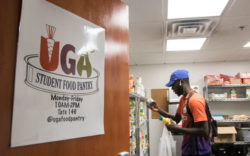The Clarke County School District has once again earned a Golden Radish Award, its fourth since the award was founded in 2014. This year, the district was one of nine recognized at the platinum level for its many efforts related to the farm-to-school movement.
CCSD has been a leader in farm-to-school, backed by an army of UGA-based employees and volunteers. It comes as no surprise that UGA Extension agents fall among those ranks not only in Clarke County, but in counties throughout Georgia. Now, the Extension joins Georgia Organics and the Georgia’s Departments of Agriculture, Education and Public Health as an official partner of the Golden Radish Award program.
The new partnership is a long time coming. “We’ve been doing the work for years, and now we’re being recognized for it,” says Becky Griffin, who works as a school and community garden specialist for UGA Extension and was responsible for brokering the new partnership with Golden Radish. “Across the state, extension agents and master gardeners, 4H agents and [Family and Consumer Science] agents were doing a lot of the work that the Golden Radish awardees turned in to get nominated,” Griffin says. “We were already doing this work, but we weren’t getting any recognition for it.”
That was becoming a problem for agents, says Griffin, because Golden Radish status also meant schools were checking off another box toward meeting new STEAM certification requirements. The STEAM (Science, Technology, Engineering, Arts and Math) approach is gaining momentum across the country. “Schools are clamoring to get that [STEAM certification],” she says. “We can’t have every school in the district banging down the door of the extension agent with all their other responsibilities just to be able to help those schools.”
Rather than learn the test, students learn new concepts through hands-on projects, which can span multiple disciplines and grade levels. Agriculture projects are particularly well-suited to this style, says Griffin. A school garden can facilitate several lessons at once. For example, says Griffin, third graders can make compost, while fourth graders learn about soil science, and other students can use math to figure out how much lettuce is growing per square inch of soil.
UGA Extension’s formal partnership may help county agents bargain for more funds to support farm to school programs from local decision-makers, says Griffin, which is a win-win for everyone.
Griffin will be a permanent member on the award committee, and her goal for 2018 is to increase outreach to counties who want to qualify as a Golden Radish school but don’t know how to start. “A lot of these counties start with a principal with an idea or a teacher who’s never gardened,” she says. In contrast, Griffin describes Athens as the Cadillac model: “Having UGA in your backyard is a real asset.”
The awards committee specifically praised CCSD for the School Lunch Challenge, where chefs from popular restaurants in Athens compete in a cooking competition; Hugh Acheson’s outreach visit to the Early Learning Center on “Aw Shucks Day,” where preschoolers got to shuck their own Georgia-grown ears of corn; and for incorporating farm-to-school into the district wellness policy. “The benefits for the students are not just that they’re eating food that’s local and healthy,” Griffin says, “but they’re understanding more about where the food actually comes from, that farming is hard work, and that these things don’t just show up on a grocery store shelf.”
The farm-to-school mission emphasizes interactions between schools, farmers and the community on top of sourcing locally grown food. Between the 75 district honorees, schools served over 97 million meals that featured locally grown and raised foods.
“We’re the best agriculture state in the nation,” Griffin says. “Being able to connect that with kids is powerful.”
Like what you just read? Support Flagpole by making a donation today. Every dollar you give helps fund our ongoing mission to provide Athens with quality, independent journalism.










